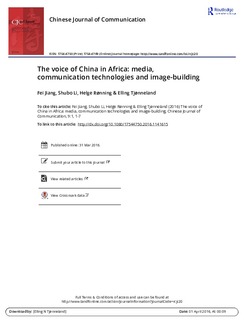| dc.contributor.author | Jiang, Fei | |
| dc.contributor.author | Li, Shubo | |
| dc.contributor.author | Rønning, Helge | |
| dc.contributor.author | Tjønneland, Elling N. | |
| dc.date.accessioned | 2018-01-04T08:22:19Z | |
| dc.date.available | 2018-01-04T08:22:19Z | |
| dc.date.issued | 2016-03-01 | |
| dc.identifier | oai:www.cmi.no:5860 | |
| dc.identifier.citation | in Chinese Journal of Communication vol. 9 no. March 2016 pp. 1-7 | |
| dc.identifier.issn | 1754-4750 | |
| dc.identifier.uri | http://hdl.handle.net/11250/2475305 | |
| dc.description.abstract | There is a fascination with the increasing economic and political importance of China in the global economy, in international politics, and in African affairs. China’s rapid economic expansion in Africa, together with economic growth on the continent, has led to a new dynamism in Africa’s relations with the outside world. This emergence is most clearly evident in the struggle for access to Africa’s oil and other raw materials, but also in the strengthened political position and bargaining power of many African governments (and in the reduced influence of the West).
Most of the focus on China and Africa has considered the economic aspects of the relationship and its implications for development in Africa. Less has been written on the political, cultural, ideological, and media aspects of this cooperation.
This issue of the Chinese Journal of Communication (CJC) is part of an attempt to provide preliminary answers to the many questions regarding China’s “public diplomacy” or “soft power” initiatives. The answers are partly an outcome of the research project entitled, “The Voice of China in Africa” , which is based here at CMI.
Through research articles and commentary in this special issue, we seek to provide answers to the following questions: What impact does Chinese media expansion have on Africa? How is China perceived in African media? How are African issues reported in Chinese media? What role does CCTV play?
The analyses in the articles of this special issue question whether Chinese media initiatives in Africa contribute to China’s soft power. This question is particularly important, as the concept of soft power increasingly has come under criticism for being too facile a way of characterizing the many facets of China’s media, communication, and investment in Africa. Rather than positing China’s attempts at building its public image in Africa | |
| dc.language.iso | eng | |
| dc.relation | Chinese Journal of Communication | |
| dc.relation | March 2016 | |
| dc.relation.ispartof | Chinese Journal of Communication | |
| dc.relation.ispartofseries | Chinese Journal of Communication vol. 9 no. March 2016 | |
| dc.relation.uri | https://www.cmi.no/publications/5860-the-voice-of-china-in-africa-media | |
| dc.subject | Media | |
| dc.subject | Soft Power | |
| dc.subject | Africa | |
| dc.subject | Kenya | |
| dc.subject | South Africa | |
| dc.subject | Tanzania | |
| dc.title | The voice of China in Africa: media, communication technologies and image-building | |
| dc.type | Journal article | |
| dc.type | Peer reviewed | |
| dc.identifier.doi | 10.1080/17544750.2016.1141615 | |
